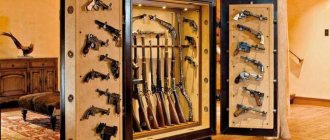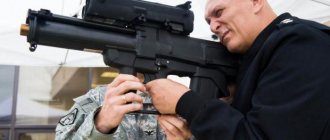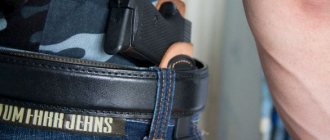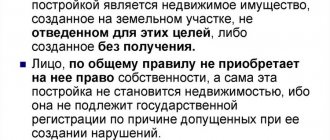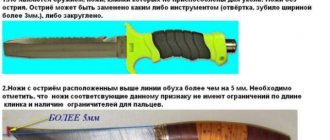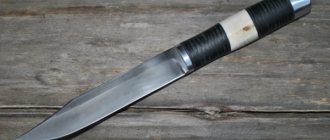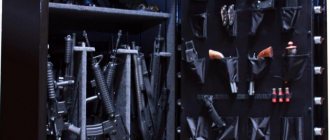A hunter has the right to purchase weapons on the basis of a license (Article 13 of the Law on Weapons of the Russian Federation of November 13, 1996). The legislation also regulates the procedure for its storage and determines the authorized supervision structures. Control functions over the circulation of civilian and service weapons are assigned to the internal affairs bodies. They are authorized to carry out supervision, for which they are endowed with appropriate rights.
Many owners of civilian hunting rifles are interested in the requirements for a safe for storing hunting weapons. After all, you will need to deal with the local inspector two or three times a year. The duties of the district police officer include periodically checking the safety of the weapons arsenal stored at home in the territory entrusted to him. What does the law say, what are the legal aspects of storing smooth-bore and rifled hunting rifles? Below are a number of documents regulating this procedure.
Rules for storing weapons
Purchasing a hunting weapon is not difficult, but a person will have to deal with paperwork. First of all, you need to obtain a license to purchase firearms. Doing this is quite problematic, so it is recommended that you first familiarize yourself with all the legislative nuances.
In addition to having a license to purchase a weapon, a hunter must also obtain permission to store it. This is another lengthy bureaucratic procedure that cannot be avoided.
Note! Possession of firearms without a permit may result in criminal prosecution.
To obtain permission to store hunting weapons at home, you need to contact the appropriate authority. This permit is offered to be purchased, but before this a person will have to undergo a lengthy check.
A medical examination is required. Mandatory doctors include a narcologist, an ophthalmologist, a psychiatrist, and a therapist. The medical examination is required to be completed at the clinic at your place of residence. Then the hunter is given a conclusion, on the basis of which a storage permit is issued.
The purpose of such a medical examination is to prove that the person is mentally healthy. Insane citizens should not keep firearms at home, otherwise it would lead to chaos.
You definitely need to visit a narcologist and undergo an examination. If a person has been diagnosed with dangerous addictions (including alcohol), which equates to mental illness, he cannot keep weapons. The fact is that no one can guarantee that a hunter in a state of alcoholic intoxication will not take out a gun to show off, and will not accidentally injure people around him.
It is also important to check with an ophthalmologist to rule out inattention and errors when handling weapons due to poor vision.
In general, a gun permit is necessary to protect civilians from the potential danger posed by someone who carelessly handles a firearm.
Firearms must be stored in special conditions that prevent children or unauthorized persons from gaining access to the dangerous item. In this regard, the hunter must understand that storing weapons is a responsibility, including a criminal one, which falls only on his shoulders.
Procedure for obtaining storage permission
Before obtaining the right to carry a weapon, a medical examination is required.
A permit to store a weapon is issued on the basis of a license to purchase it. Like a license, a storage permit has a validity period of 5 years from the date of issue. After this period, the permit must be renewed.
Responsibility for violating the procedure for using weapons
Any violations of storing or carrying hunting or other types of weapons are strictly punished. Depending on the offense, both administrative and criminal liability may be applied.
Administrative responsibility
The Code of Administrative Offenses of the Russian Federation has several articles regulating the rules for handling weapons . Let's look at the most commonly used of them:
- Art. 20.8 – violation of the rules for storing, carrying and destroying weapons. For example, the lack of safes or alarms, carrying a pistol in your pocket, the presence of weapons at a rally, etc. Such behavior threatens with a fine of up to 2,000 rubles or deprivation of the right to store weapons for a year.
- Art. 20.9 – installation of a night vision or silent shooting sight on the weapon. Such tuning is fraught with fines of up to 2,500 rubles with confiscation of installed devices.
- Art. 20.11 – violation of deadlines for registering weapons. The fine for violation will be a maximum of 3,000 rubles. Sometimes you can get by with a warning.
- Art. 20.12 – violation of the rules for transporting weapons provides for a fine of up to 3,000 rubles and deprivation of the right to own weapons for up to 2 years.
- Art. 20.13 – shooting in undesignated areas. This is the same hunt in the wrong place. Responsibility will be applied in the form of a fine of up to 5,000 rubles with confiscation of weapons.
For carrying a weapon by a drunk person in 2021, a fine of up to 5,000 rubles is provided with confiscation of weapons and ammunition.
Criminal liability
In the Criminal Code of the Russian Federation, responsibility for the illegal acquisition and storage of weapons is enshrined in Art. 222 . According to the article, such actions are a crime and involve the following types of punishment:
- Restriction of freedom up to 3 years;
- Forced labor for up to 4 months;
- Arrest for six months;
- Imprisonment for up to 4 years.
Six years in prison can be received for committing a crime by prior conspiracy by a group of persons, and 8 years for an organized crime group.
If a criminal voluntarily surrenders illegally acquired weapons, he may be released from criminal liability.
Hunting weapons are a type of civilian weapon and have similar acquisition and storage rules as weapons for self-defense.
Current legislation strictly regulates the rules for storing any weapons that pose a danger to society.
When obtaining a weapons license, you need to understand the full responsibility of such ownership, the possible risks and be prepared to bear responsibility for violating established legal norms.
Rules for foreign citizens
Recently, hunting tourism has become increasingly popular in the Russian Federation. At the same time, foreign citizens import their personal firearms and hunting weapons into the country, and are often interested in the peculiarities of storing them on the territory of another state. The rules here are generally the same as for citizens of the Russian Federation.
The person will be required to provide a hunting license, the right to purchase a weapon, and relevant documents for the specific model of firearm. A foreigner may carry his own gun or hunting rifle exclusively within the hunting grounds, but independently transporting his own weapon to his destination is not prohibited; the restriction only applies to carrying it in populated areas.
To ensure safe storage, a person must have a special locking case that guarantees the safety of the weapon and protects against unauthorized access to the weapon by strangers.
Is it possible to store an assembled gun in a safe?
> > Is it possible to store a gun in a safe, unassembled, unloaded, a double-barreled gun, i.e.
with detachable trunks? ******************************** Possible, not even negotiable. Disassembly requirements are not indicated anywhere.
In addition, there are clearly no requirements to carry weapons without ammunition, we just carry them away out of sin, but we are NOT OBLIGATED TO DO THIS, because this requirement according to the Law applies only to legal entities.
But you understand, the cop is also a person and interprets everything in his own way.
IMHO that’s why Saiga and equipped separately is optimal. ********************************* 3.
Is it possible to transport a gun unloaded, in a case, but again, unassembled? ************************* You can, besides, not all guns can be disassembled. It’s just that a disassembled gun takes up much less space **************************** 4. Is it possible to use a large rag instead of a case to transport a disassembled, unloaded gun?
Those.
Who is prohibited from storing?
If a person has previously had problems with the law, his application to possess a weapon may be rejected.
A person may be denied a permit to possess a weapon in several cases:
- mental health disorders;
- lack of conditions for storing weapons;
- existence of fines for improper storage.
Thus, a permit may simply not be issued if there are doubts about a person’s mental health. In this case, the possession of firearms raises a number of questions; however, people with unstable mental health are usually not given a license to purchase such weapons.
Before issuing the corresponding document, the local police officer or inspector must check the presence of a special safe to ensure the safe storage of weapons by the hunter. If the safe, or the room in which it is installed, does not meet the standards, it will not be possible to obtain permission.
Monitoring compliance with established storage conditions
Remember that after you have bought and installed a gun safe in your apartment or private house and started storing weapons and ammunition in it, you will be regularly checked by an authorized police officer (for example, a district police officer), who is obliged to monitor compliance with the conditions for storing weapons at home . The duties of such police inspectors include checking the safety of weapons for which the appropriate permit has been issued, as well as checking to ensure that they are not accessible to unauthorized persons, including relatives and friends of the weapon owner.
Please note that checking the inaccessibility of weapons to unauthorized persons also includes such an aspect as the inability to open a gun safe without the owner of the weapon. The police can resort to cunning when carrying out such an inspection, for example, a police officer arrives at the address where the owner of the weapon lives while he is not at home, the door is opened for them, and at that moment the inspector asks one of the family members to present the weapon for checking license plates, provoking relatives to open the safe on their own, which means violating the rules of inaccessibility of weapons to strangers. If, in response to such a request, relatives open the safe and present a weapon, then an administrative violation report is immediately drawn up, the weapon is confiscated, and the owner of the weapon is brought to administrative responsibility.
It is extremely important for the owner of a weapon to comply with all requirements for the storage of civilian weapons, taking seriously the norms of the Federal Law dated December 13, 1996 N 150-FZ “On Weapons”, Order of the Ministry of Internal Affairs of Russia dated April 12, 1999 N 288 “On measures to implement the Decree of the Government of the Russian Federation dated 21 July 1998 N 814", as well as the conditions listed in the "Instructions for organizing the work of internal affairs bodies to control the circulation of civilian and service weapons and ammunition on the territory of the Russian Federation" and the Decree of the Government of the Russian Federation N 814 "On measures to regulate circulation of civilian and service weapons and ammunition for them on the territory of the Russian Federation" dated July 21, 1998 (together with the "Rules for the circulation of civilian and service weapons and ammunition for them on the territory of the Russian Federation").
Requirements for the placement of hunting weapons
Basic rules for storing hunting weapons:
- weapons must be kept in a locked safe;
- ammunition should be kept separately;
- different types of weapons can only be stored separately and exclusively in disassembled condition;
- Storage of gunpowder is allowed only in separate cells of the safe, away from other ammunition.
To store hunting weapons and ammunition, you need a reliable safe equipped with separate cells. Separate storage is necessary to ensure that an unauthorized person cannot gain access to a weapon ready to fire. This is especially important for families with small children, as these rules serve as an additional guarantee that the child will not gain access to a dangerous toy.
Note! Possession of loaded weapons is strictly prohibited. Violation of this rule may result in a fine, confiscation of the weapon and the license to possess it.
The safe must be made of high-quality metal and equipped with a reliable lock.
Weapon storage room
Storing a collection of weapons requires special conditions and the installation of a security system with output to a police console.
Some hunters can boast of an impressive collection of firearms, which in the hands of an attacker becomes a serious threat to people's lives. To store several rifles or shotguns, you must allocate a separate room. Basic Rules:
- The storage cabinet should be located away from heating appliances;
- the cabinet must be locked with a key, the lock of the safe must be secure;
- there should be no flammable liquids or faulty equipment in the room;
- the premises must be protected from unauthorized entry through windows.
If a person has a large collection of firearms, special metal cabinets are used to store them. Such cabinets are equipped with many different cells for storing different parts of the weapon. Separately made boxes for ammunition and gunpowder.
Requirements for storing a large collection of hunting weapons include the need to install an alarm on the premises.
Additionally, you should take care of bars on the windows and a secure entrance door that will protect against unauthorized entry into the room. Of course, the cabinet for storing weapons is locked with a lock, the key to which must be kept only by the owner.
Types and characteristics of gun safes
The current requirements for the characteristics of gun safes are such that they must be made of metal or wood, but lined with iron, and the safe must have a lock to limit unauthorized access to weapons and ammunition stored inside the safe. . In addition, the safe must be fire-resistant and burglar-resistant, while you can either buy a ready-made gun safe or make it either yourself or to order, the main thing is that the thickness of the metal wall of the safe is at least 2 mm . The gun safe must have a deadbolt system that can lock the door in at least three directions.
It’s worth mentioning separately about locks for safes; there are several types and many models on the market; they can be classified as follows:
- Mechanical key locks.
- Mechanical locks with code.
- Electronic locks with code.
- Electronic locks with magnetic keys.
- Electronic locks with biometrics (fingerprints, retina pattern).
- Combination locks that include several types of security.
Before buying a gun safe, you should study its characteristics and read reviews on relevant websites and thematic forums in order to choose the optimal price-quality ratio, as well as dimensions that will allow you to conveniently place the safe in your apartment or house.
Fire resistance of gun safes
Since cartridges and gunpowder are stored inside a gun safe, it must be fire-resistant, the requirements for this characteristic are given in GOST R 50862-2005, while the temperature regime for exposure to safes is established by GOST 30247.0-94 (ISO 834-75). Gun safes must be resistant to fire hazards and comply with one of the fire resistance classes.
Yes, the high fire resistance class of a safe raises its price, but safety is more important, so pay attention to this characteristic when choosing a safe for storing weapons and ammunition.
Requirements for the interior of gun safes
A gun safe should have compartments for storing gunpowder and cartridges, as well as fixtures and fittings that can secure the weapon in a stationary position to prevent the weapon from falling and causing accidental discharges. Such clamps (cradles) can be made of both metal and polymers.
At the bottom of the gun now there should be a stock made of wood, plastic or felt, in which there are recesses for fixing the butts of hunting shotguns / rifles.
According to GOST R 56367-2015, safes and metal cabinets for storing civilian weapons must be equipped with a lockable tray (a compartment whose metal walls must be at least 3 mm thick) for storing cartridges.
Requirements for placing gun safes indoors
Separately, it is worth considering the rules for placing gun safes in residential premises, noting that the legislation imposes different requirements on the conditions for storing firearms for individuals and legal entities. For example, Federal Law 150-FZ “On Weapons” contains the following lines:
“Civilian and service weapons must be stored in conditions that ensure their safety, security of storage and exclude access to them by unauthorized persons. Requirements for the storage conditions of various types of civilian and service weapons and ammunition for them are determined by the Government of the Russian Federation.”
And the “Instructions for organizing the work of internal affairs bodies to control the circulation of civilian and service weapons and ammunition for them on the territory of the Russian Federation” to the Order of the Ministry of Internal Affairs of Russia dated April 12, 1999 N 288 contains the requirements:
"162. Citizens of the Russian Federation must store weapons and ammunition that belong to them at their place of residence in locked safes or metal cabinets, boxes made of high-strength materials or in wooden boxes lined with iron in compliance with conditions that ensure the safety of weapons and ammunition, the safety of their storage and exclude access to him of strangers."
At the same time, for legal entities, the requirements for placing gun safes indoors are specified more specifically in the instructions to Order of the Ministry of Internal Affairs of Russia No. 288 dated April 12, 1999:
"167. Safes, cabinets, pyramids, boxes and racks are placed in rooms no closer than 1.5 m from the entrance doors and 0.5 m from window openings, and boxes with cartridges and aerosol packages - no closer than 1 m from heating devices. The distance in front of safes, cabinets and pyramids must ensure that their doors can be opened without hindrance.”
And in paragraph 169 of this “Instruction” all the requirements are spelled out in detail - the thickness of the walls, the equipment of door and window openings, connecting the room to a security alarm, etc.
It turns out that the place in the apartment (private house) for installing the safe is chosen by its owner independently , guided by common sense and safety; current legislation does not regulate this for citizens, owners of hunting or traumatic weapons.
Yes, in accordance with GOST R 56367-2015, a gun safe weighing less than 100 kilograms must have an anchor hole for fastening it indoors. When the height of a gun safe is up to 0.5 m, at least one hole for anchor fastening is required, and when the height of the safe is more than 0.5 m, at least two holes are required for anchor fastening: the first anchor hole must be located in the bottom of the safe, the second hole must be located in the back wall of the gun safe at a distance from the bottom of at least 2/3 of the height of the safe. But these requirements formally do not apply to individuals , but to organizations.
But the district police officer who will check the conditions for storing weapons, seeing a safe that is not secured (to the floor or to the wall), may regard this as a failure to comply with “the conditions that ensure the safety of storing weapons and ammunition and precluding access to them by unauthorized persons.” After all, very often safes weigh a couple of tens of kilograms, and can simply be taken out of the apartment by criminals. Therefore, our advice is to, if possible, anchor your gun safe to the floor or wall.
How to hide a gun safe
Let us remind you that the law does not regulate the location of a gun safe in a residential area, but if the owner does not want to draw the attention of potential guests to the fact that weapons are stored in the apartment or house, then the safe can be “hidden” by placing it so that its presence is not obvious in the eyes. It is logical that installing a gun safe in the hallway or living room is undesirable, but the bedroom, closet or dressing room are quite suitable places where you can place the safe.
At the same time, you can take an even more creative approach to disguising the safe - you can mark it inside the closet, in which case it will be located behind the door, and even hidden by the clothes stored in the closet, which will make it extremely unnoticeable. You can go by placing the safe inside the wall, if you have your own home and the wall is not load-bearing, and cover it with interior items from the outside.
Who stores guns?
Moderator: Search 40 messages
- 1
Sub-ensign
Messages: Registered: April 9, 2007, 09:41 » April 18, 2007, 17:01 There are three smooth-bore guns Sauer, TOZ, IZH.
I store them like this. I check whether the hammers are pulled or not, disassemble them, and fasten the forend to the barrels. Each in its own hand-sewn case.
I put each gun in its own case and then, of course, in the safe. Once a month I take them out, so there is grease on my hands.
The safe is tall and allows you to store assembled guns. For this purpose, there is a wooden plank with slots for the trunks.
So here's the question. If you store guns without disassembling them and putting them in cases, will this harm them?
I mean changes in humidity that are inevitable even in houses with central heating, sagging of some springs, drying out of grease, etc. How SHOULD you store weapons?
Assembled or disassembled?
In this case, it’s the pros who are interested, not the police’s opinion.
General provisions
Is it possible to store weapons at home? The requirements and rules corresponding to this issue in relation to individuals are set out in the Law “On Weapons” of 1996 in Article 22 “Storage of service and civilian weapons, as well as ammunition for them.”
According to the standards for storing traumatic weapons, only citizens who have a special permit have the right to store them at home. It should be noted that weapons, the acquisition of which is possible without registration with the Department of Internal Affairs and a license, can be stored without documented permission. Thus, in certain cases, without registration and a license, it is still possible to organize the storage of weapons at home. The relevant types include the following:
- Specialized products whose design is similar to that of a weapon.
- Pistols and rifles with a muzzle energy of three joules, as well as air revolvers.
- Revolvers with a caliber of up to six millimeters, as well as cartridges for them.
- Signal pistols.
